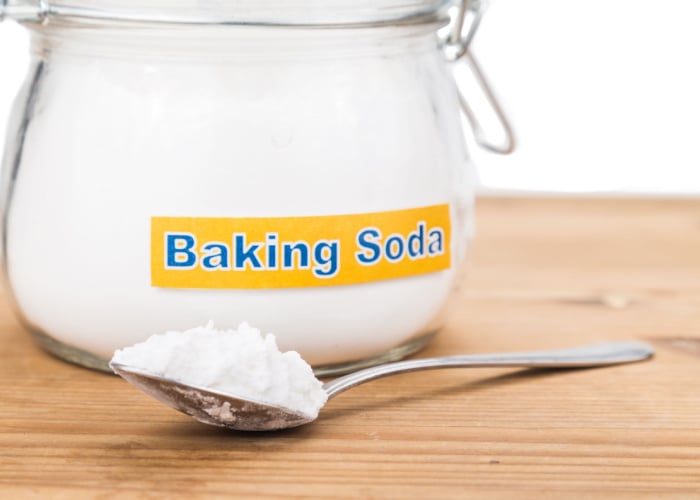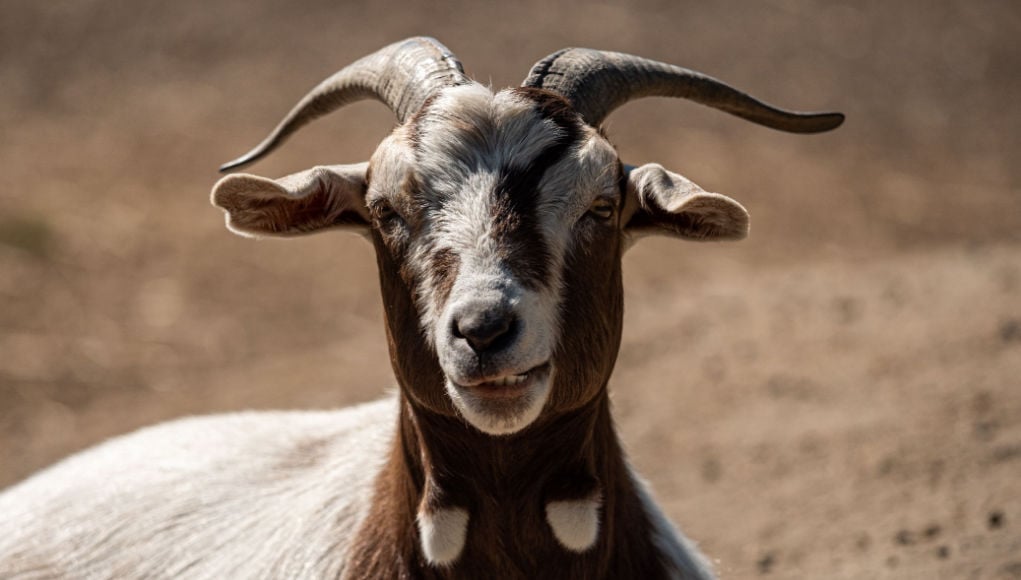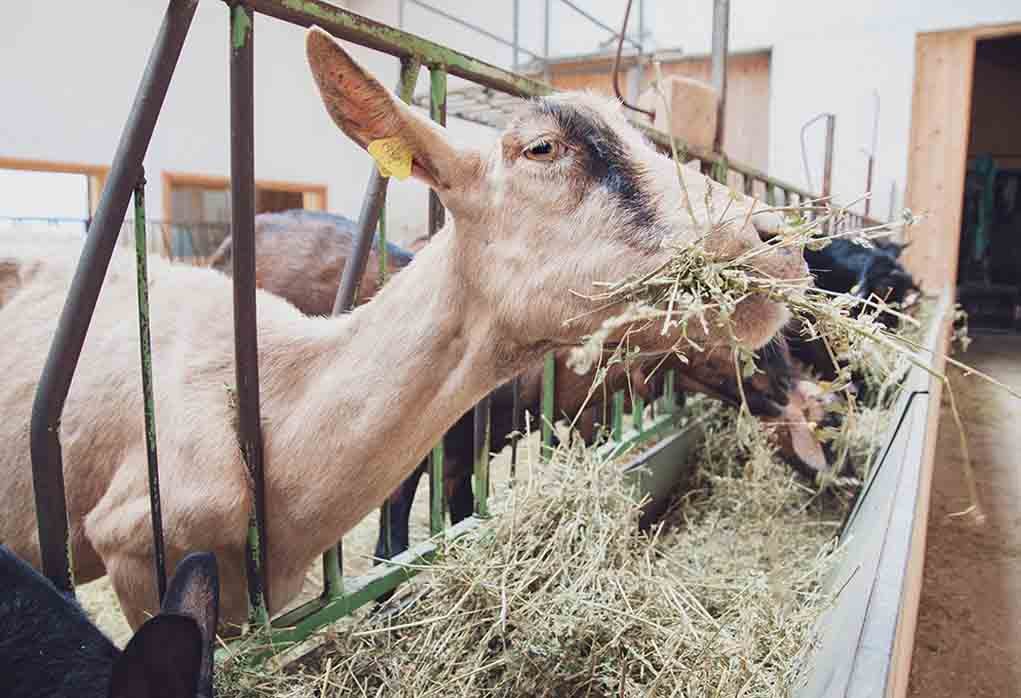Feeding baking soda to goats as a remedy for bloat is common among goat keepers.
膨胀,我国y life-threatening condition characterized by excessive gas accumulation in the rumen, can occur when goats consume large amounts of highly fermentable food or graze on legume-rich pastures.
Baking soda, also known as sodium bicarbonate, is believed to help neutralize excessive acid in the rumen and alleviate bloating symptoms.
This post covers the use of baking soda as a preventive or treatment measure for goat bloat, exploring its effectiveness and considerations for safe administration.
Let’s get into the details!
Why Use Baking Soda for Goats?
Baking soda neutralizes the pH of your goat’s stomach quickly.
Think of it as a heartburn medication but for goats.
If you feed your goats a lot of grass, pasture, or grains, you should strongly consider offering baking soda.
Of course, replacing grass for brush and bramble is the better option, but we understand that it isn’t always viable for all goat keepers.
This is where baking soda comes in handy.

山羊的消化系统是如何工作的
Still confused about how baking soda for goats works?
Then let’s discuss a goat’s digestive system.
Once you understand how the inside of a goat operates, baking soda will make a lot more sense.
Goats are ruminant animals with special four-compartment stomachs and chew their cud.
Their multiple-chamber stomach works a lot like a fermentation vat.
First, the goat chews and breaks up some food into smaller pieces in the mouth, using their teeth.
This stage also coats the food with saliva.
The food then travels into the rumen, the esophagus, and the reticulum.
The rumen breaks down the goat’s food; this area has no oxygen.
Here, the bacteria break down the fiber that the goat ingested and start the fermentation process.
This process creates a lot of heat, which is beneficial for keeping your goats warm in the winter.
After this, the food moves onto the “true stomach.”
The goat’s true stomach then digests the fermented food particles, which are more palatable now, so the goat can better absorb the nutrients.
The acid in the true stomach digests the smaller food pieces more efficiently.
Next, the food moves into the intestines.
This is basically a long tube where the nutrients from the food are absorbed into the goat’s body.
Anything that the goat’s body doesn’t need passes through the intestines and comes out as manure.
Goats Naturally Produce Their Own Sodium Bicarbonate
Goats will leisurely grazeand eat small amounts of food throughout the day as they move around.
Contrary to what many people think, goats are not primarily grass eaters.
Their diet ideally should consist of shrubs, leaves, weeds, and brambles rather than grass.
Goats produce their own bicarbonate when they chew the cud that they sourced from weeds, saplings, branches, leaves, brush, or thorny thickets.
Sometimes you can even see this bicarbonate; it appears as the foam at the mouth while they’re chewing.
The less a goat chews, the less bicarbonate they produce.
More palatable foods like grasses and grains result in less bicarbonate being produced.
Providing a bramble or brush-type diet for goats can be challenging for modern goat keepers who must keep their animals in fenced areas.
It’s difficult to add more once a goat has cleared a pasture of brambles.
So, when goats are put on set pastures, they must eat grass instead.
This is where issues begin– if they consume too much grass at once, it can overwhelm the somewhat fragile bacteria in their stomach.
Rich foods like grain, alfalfa, fruits, and some vegetables, can have the same effect, causing fermentation gases to build up, leading to bloat in more severe cases.
Goats naturally pass gas as their break down and digest their food.
This is a by-product of the fermentation process.
But when grasses overrun a goat’s stomach, the goat may not be able to pass enough gas, leading to painful bloating where the sides of the stomach expand and ache.
This can be fatal if severe enough and not properly treated.

Signs of Bloating in Goats
Stand at the front of your goat so you’re both facing each other.
Look at your goat’s stomach (barrel) area from this position.
If the stomach is equally round on each side, the goat is healthy and not experiencingbloat.
If the left side (your left or your goat’s right) is extended more than the right side, then this is a sign that the rumen is bloated.
Very gently tap on the stomach; it may sound like a tightly drawn drum.
If your goat seems uncomfortable when you do this, that’s a strong indicator of bloat.
Other signs include pawing, moaning, bellowing or bleating, teeth grinding, or resting their head against trees, barn sides, pasture mates, or fence posts.
How To Feed Baking Soda To Goats
Set out a dish or trough that is designated only for baking soda.
Never mix it in with their feed, grains, hay, or water supply, or mix it with minerals; it should stand alone in a separate container.
You should also keep it in a dry area where the goats are able to find it relatively easily.

Remember that goats should always have free access to fresh, clean water at all times.
This is especially true when they can access salts and minerals because it will dehydrate them faster.
And don’t forget to check on the baking soda supply every day.
Replenish it as needed, and replace any baking soda that is dirtied by urine, manure, or other unpleasantries.
Don’t worry—you don’t need to monitor or encourage your goats with it; they can self-medicate and regulate themselves as needed.
Is Baking Soda Effective for Treating Bloat?
TheIranian Journal of Applied Animal Scienceput this question to the test with 42 goats and sheep.
They gave these animals access to bread, fruits, rice, and vegetables and then treated them with sodium bicarbonate (baking soda).
All but two of the animals fully recovered, revealing that baking soda does seem effective.
And in this study by theJournal of Veterinary Clinics, researchers fed a herd of forty goats large quantities of grain.
Part of the herd was later given baking soda to combat the bloat, while the other was not as a control group.
The entire control group died.
同样的研究也表明,口服镁hydroxide at 1 gram per kilogram of body weight effectively treated bloat.
Ginger, nuxvomica, cobalt sulfate, dried ferrous sulfate, and thiamin mononitrate (oral) also proved to be helpful.
Baking Soda For Goats FAQ
Here are a few frequently asked questions regarding goats and baking soda.
How Does Baking Soda Help Goats?
Baking soda helps goats balance the pH values in their rumen so that they do not experience painful, sometimes deadly bloat.
Why Give a Goat Baking Soda?
You should give your goats baking soda if they eat a diet that consists of easily palatable foods that do not require much chewing.
Grass, hay, grains, fruits, and vegetables in excessive quantities can cause bloat.
A diet of brush, weeds, briars, brambles, tree saplings, and other forest vegetation allows the goat to produce more sodium bicarbonate on their own.
If your goat isn’t able to produce enough sodium bicarbonate on their own, supplementing it is helpful.
Is Baking Soda Safe For Goats?
Baking soda is generally regarded as safe for goats.
They will self-regulate their intake as needed, ingesting more when needed and less (or none) when they don’t.
Baking Soda for Goats: Final Thoughts
Stocking up on baking soda is always a good idea, as it could help treat your goat’s boating.
Just serve them on a separate, clean dish, and they’re good to go!
Interested to learn more about feeding goats? Check out our recommended articles below!



